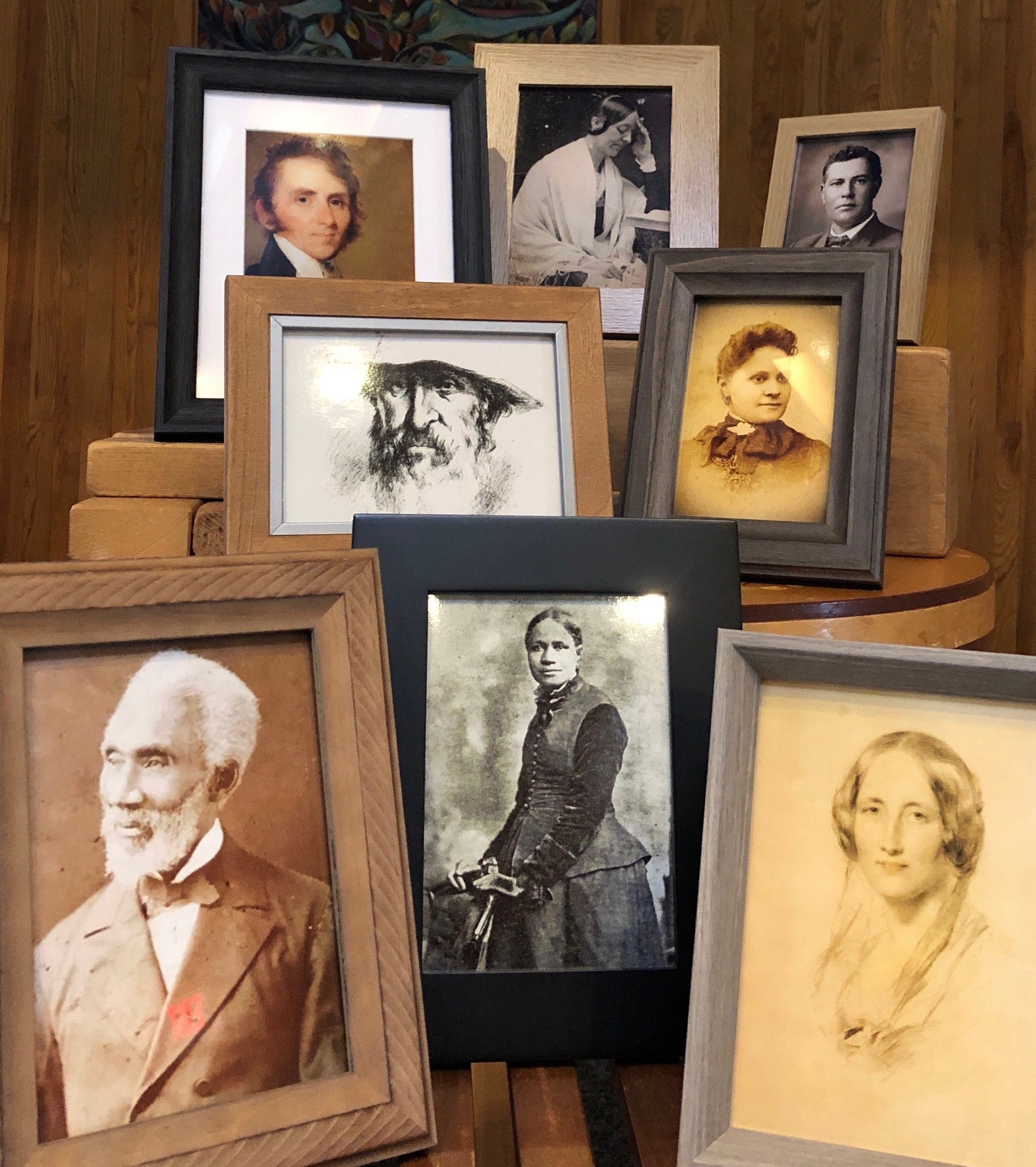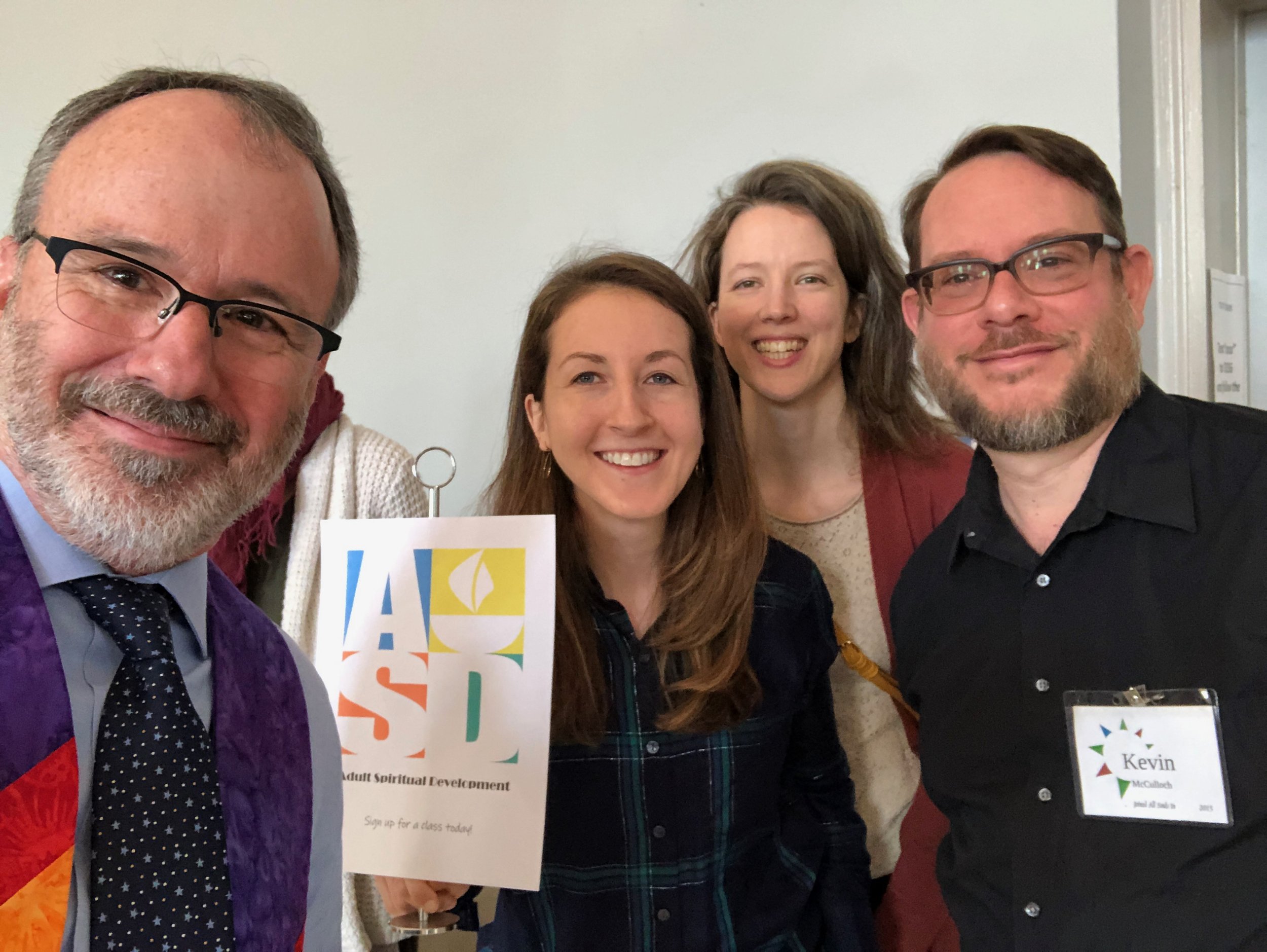
Spiritual Formation for
Seekers of All Ages
A Complicated Heritage
When introducing Unitarian Universalism to potential members, I emphasize that our theology is captured in our name. Unlike traditions named for governance structures or founders, we put our faith front and center. While the meaning of that name has evolved over the centuries, we still look to “Unitarian” as an acknowledgement that we are united in a shared destiny, and that the spark of the Divine can be found in each of us. “Universalism” reminds us that we are all worthy of love, all connected through our shared “inherent worth and dignity.”
We must also acknowledge that our history carries elements that are deeply disturbing. Some of our forebears were leading abolitionists, but others were slave holders or beneficiaries of the slave trade. That complicated history is carried forward through more recent times. It encompasses involvement in the eugenics movement during the last century and, most recently, a realization of long-standing discriminatory hiring practices.
I don’t believe we should feel shame for the past, and I don’t think we should be unforgiving of those who preceded us. But it’s of vital importance that we understand our complicated heritage. That commitment is central to my work in Adult Spiritual Formation, just as it’s central to the beauty and challenge of our Fourth Principle: The free and responsible search for truth and meaning.
Our Children
Children should experience church as a place of fun and friendship. In teaching English to struggling high school students, I first helped them experience the simple joy of reading. Only then could they imagine all the rewards to come. The same is true at church. Developing deep-thinking, action-oriented Unitarian Universalists is possible if our children’s first experience is one of joy.
A Time for All Ages is the ideal place to cultivate this sense of joy. I take great pleasure in creating interactive stories that engage the whole community. This often involves a call-and-response format, with the congregation bringing voice and action to set cues. Such moments are worshipful while also being improvisational and lighthearted.
Emerging from the pandemic, we must be ready to rethink our Religious Education practices and explore new ways of bringing our children into community. The speed with which children develop means that a two year gap in attendance has long-lasting consequences. Responding to that truth will require collaborative thinking across congregations.
Our Teens
I’ve loved working with teens ever since founding the Signature in the Schools theatre outreach program. For ten years we produced original plays that were cast and staffed by students, with professional designers, stage managers, and actors serving as mentors. That emphasis on experiential learning later fueled my work as a classroom teacher, department chair, and educational coach. More recently, through participating in Coming of Age programs at two large churches, I’ve had the pleasure of watching teens make sense of our history, finding inspiration in the likes of Henry David Thoreau and Frances Ellen Watkins Harper, and finding reason for concern in the actions of many who preceded and followed them. While our younger children need joy at the center of their church experience, our teens are best served by a sense of exploration and questioning.
I’m especially grateful for the teen members of my Worship Committee. They’re dynamic Worship Associates, bringing nuance and vitality to readings and litanies. They’ve also played a key role in improving our weekly liturgy. Best of all is when they step into the pulpit as Lay Preachers. It’s an empowering experience for them and a gift to the congregation, which benefits from their perspective and wisdom.
Across Generations
Too often “RE” refers only to children and teens. But Religious Education is essential for every member of the congregation. As Minister for Adult Spiritual Development at All Souls, DC, I collaborated with a stellar committee to develop courses ranging from “Womanist Theology” to the lay-led “The Theology of Fleabag,” inspired by the provocative TV series. These one-time courses were complemented by foundational classes like “Unitarian Universalist History and Theology” and “Unitarian Universalist Spiritual Practices.”
To avoid becoming too intellectual, we made “embodied theology” our theme. This included a class on “Music to Inspire Justice Seekers,” and a drumming workshop titled, “Sacred Sound Circle: Exploring Shamanic Journeying.” Film discussions, gallery visits, and theatre outings also proved powerful and popular.
The Adult Spiritual Formation courses that I teach always center on a “Community of Learners.” Minimal lecturing occurs and no one is considered an expert. We dive into the material together, often starting with a provocative opening question and allowing the conversation to unfold from there. This allows for true religious exploration. It proved especially effective when I taught “Our Shared Theology,” a course that draws on the old “Building Your Own Theology” curriculum to refocus on the elements of faith that we share.



